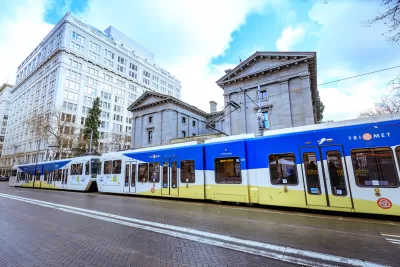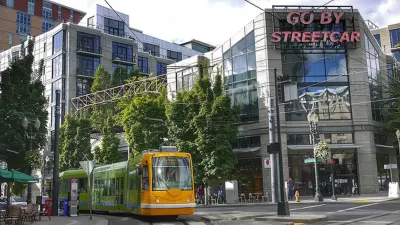A heated dispute over a $5 billion Metro transportation funding ballot measure has erupted between climate activists and a group representing Portland's big business interests.

Portland area voters will decide on a Metro transportation funding measure that could bring a new MAX line running from Downtown to underserviced southwest Portland, allow TriMet to gradually transition from diesel to electric busses, and enable several other "safety, transit, and infrastructure improvements across the Metro region," reports Blair Stenvick.
A 0.6% payroll tax on most employers with over 25 employees on payroll is proposed to fund the work. Due to the economic landscape resulting from the coronavirus pandemic, several big businesses in the Portland metro area have banded together to oppose the measure.
According to Stenvick, opposition group Stop the Metro Wage Taxt recent advertisement described the measure as "a permanent new wage tax on struggling employers and nonprofits." Multinational corporations like Nike and Intel are among the opponents of the tax.
"But for a coalition of environmental organizations supporting the ballot measure, the transportation improvements it would fund can’t wait for a more economically convenient time. These groups are framing the measure as Oregon voters’ key chance to address climate change—an issue on which the clock is ticking—during the November election," says Stenvick, noting the transportation sector as the largest emitter of carbon in Oregon.
The fate of the measure is in the hands of the voters. BlueGreen Alliance Oregon State Policy Coordinator Ranfis Villatoro wants voters to know that if the measure passes, the payroll tax would not be collected until 2022 and that 91% of employers in the metro area don't have the 25 employee payroll required for the tax.
FULL STORY: Backers of Metro Transportation Funding Measure Say Climate Change Is on the Ballot

Planetizen Federal Action Tracker
A weekly monitor of how Trump’s orders and actions are impacting planners and planning in America.

Congressman Proposes Bill to Rename DC Metro “Trump Train”
The Make Autorail Great Again Act would withhold federal funding to the system until the Washington Metropolitan Area Transit Authority (WMATA), rebrands as the Washington Metropolitan Authority for Greater Access (WMAGA).

DARTSpace Platform Streamlines Dallas TOD Application Process
The Dallas transit agency hopes a shorter permitting timeline will boost transit-oriented development around rail stations.

LA County Creating Action Plan to Tackle Extreme Heat
Los Angeles County is creating a Heat Action Plan to help communities stay safe during extreme heat, with steps like adding more shade, improving buildings, and supporting the neighborhoods most at risk.

Maryland Plans Quick-Build Complete Streets Projects
The state will use low-cost interventions to improve road safety in five Maryland counties.

Downtown Los Angeles Gears Up for Growth
A new report highlights Downtown L.A.’s ongoing revival through major housing projects, adaptive reuse, hospitality growth, and preparations for global events in the years ahead.
Urban Design for Planners 1: Software Tools
This six-course series explores essential urban design concepts using open source software and equips planners with the tools they need to participate fully in the urban design process.
Planning for Universal Design
Learn the tools for implementing Universal Design in planning regulations.
City of Charlotte
Municipality of Princeton
Roanoke Valley-Alleghany Regional Commission
City of Camden Redevelopment Agency
City of Astoria
Transportation Research & Education Center (TREC) at Portland State University
US High Speed Rail Association
City of Camden Redevelopment Agency
Municipality of Princeton (NJ)





























